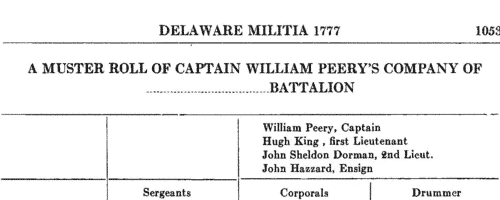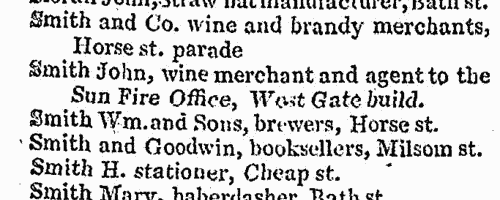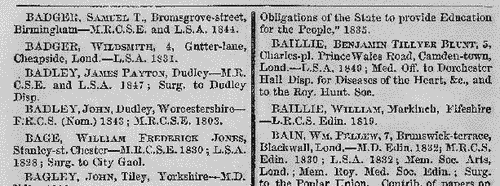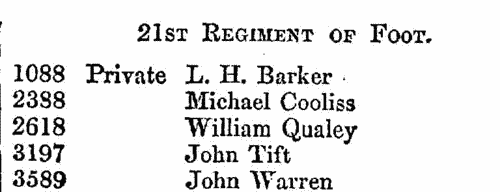 Apprentices and articled clerks
(1766) Apprentices and articled clerks
(1766)
Apprenticeship indentures and clerks' articles were subject to a 6d or 12d per pound stamp duty (late payment of the 6d rate attracted double duty (D D) of 12d): the registers of the payments usually give the master's trade, address, and occupation, and the apprentice's name, as well as details of the date and length of the apprenticeship. 2 January to 15 July 1766.MCCORD. Cost: £8.00.  | Sample scan, click to enlarge

|
Delaware Militia (1778)
Muster rolls of the Delaware state militia.
MCCORD. Cost: £8.00.  | Sample scan, click to enlarge

|
Inhabitants of Waterford
(1805)
Holden's Triennial Directory of 1805 to 1807 included a provincial section, listing professional people and traders in England, Wales, Scotland and Ireland. (The sample scan here is from the listing for Bath)MCCORD. Cost: £6.00.  | Sample scan, click to enlarge

|
Runaway Convicts Apprehended (1836)
The Principal Superintendent of Convicts' Office of New South Wales issued weekly lists of runaways apprehended during the previous seven days. These lists state the convict's full name (surname first), the transport by which brought to Australia, and from whom or from where absconded. March 1836
MCCORD. Cost: £6.00.  | Sample scan, click to enlarge

|
Runaway Convicts Apprehended (1836)
The Principal Superintendent of Convicts' Office of New South Wales issued weekly lists of runaways apprehended during the previous seven days. These lists state the convict's full name (surname first), the transport by which brought to Australia, and from whom or from where absconded. February 1836
MCCORD. Cost: £6.00.  | Sample scan, click to enlarge

|
Runaway Convicts, New South Wales (1836)
Many convicts transported to Australia subsequently absconded from custody or from farmers or traders with whom they had been put to work. The Principal Superintendent of Convicts for New South Wales issued detailed notices to the public 'to use their utmost exertion in apprehending and lodging them in safe custody' and warning against harbouring or employing them. The lists give full name (surname first); name of the transport ship by which the convict had been deported to Australia; number; age; birthplace; trade or profession; height; appearance (complexion, hair, eyes); and a brief description of how or where absconded. February 1836.
MCCORD. Cost: £6.00.  | Sample scan, click to enlarge

|
Medical Men
(1853)
The British Medical Directory for England, Scotland, and Wales of 1853 lists doctors, physicians, surgeons and other medical men. Each entry gives full name, surname first; address; qualifications; public appointments; and (where appropriate) a list of books and of works published in medical journals.MCCORD. Cost: £4.00.  | Sample scan, click to enlarge

|
British soldiers wounded at Inkerman
(1854)
Sebastopol in the Crimea was the great Russian naval arsenal on the Black Sea. A combined assault by British, French and Turkish troops resulted in the reduction of Sebastopol and led to the Treaty of Paris of 27 April 1856, guaranteeing the independence of the Ottoman Empire. In the battle of Inkerman, of November 1854, the Russian troops made an ultimately unsuccessful attack on the allied army. In December the War Office issued lists of soldiers killed and wounded at Inkerman: there are separate returns for 2 to 6 November, 7 to 20 November, and 21 to 26 November, as well as one for soldiers missing, and one for members of the Naval Brigade killed and wounded. This is the list of British soldiers wounded at Inkerman 2 to 6 November 1854.MCCORD. Cost: £6.00.  | Sample scan, click to enlarge

|
 British infantry fighting in China
(1860) British infantry fighting in China
(1860)
The China Medal was awarded to soldiers and sailors who took part in the prosecution of the war against the Chinese from 1856 to 1860. Separate clasps were awarded for men who had been in receipt of the China Medal of 1842; for being actually present at Canton on 28 and 29 December 1857, when that city was bombarded and finally captured; for being actually engaged in the operations which ceased with the first capture of the Taku Forts, 20 May 1858, and led to the Treaty of Tientsin; for being actually present at the capture of the Taku Forts 21 August 1860; and for being actually present before Pekin the day the gate of that city was given up to the allied (British and French) army, viz. on 13 October 1860. The 1st battalion, the 3rd (East Kent) Regiment of Foot (the Buffs), based in Limerick, embarked for Malta 2 April 1851. The battalion took part on in the capture of the Taku Forts.MCCORD. Cost: £8.00.  | Sample scan, click to enlarge

|
Civil Service Appointments
(1862)
The Civil Service Commission published an annual list of all persons who had obtained certificates of qualification for appointment in the various public departments. The list gives full name (surname first); department (such as Post Office, or Inland Revenue); situation (such as Letter-carrier, or Clerk); and date of certificate. Candidates whose names are preceded by a dagger obtained appointments as the result of competition; a double dagger indicates open competition. Those whose names are preceded by an asterisk obtained honorary additions to their certificates either for proficiency in extra subjects chosen by themselves, or for marked proficiency in the prescribed subjects. Then follows a further list of these candidates who had obtained Honorary Additions to their Certificates in this way: giving name (surname and initials); position in the service (department and situation); subjects for which honorary additions were made; and 'extent of knowledge displayed' (such as Creditable, Fair, or Very Creditable). 1 January to 31 December 1862.MCCORD. Cost: £4.00.  | Sample scan, click to enlarge

|
Research your ancestry, family history, genealogy and one-name study by direct access to original records and archives indexed by surname.













